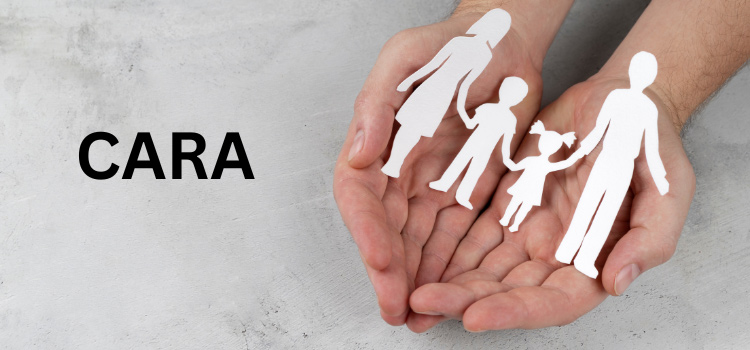The changing paradigm of the Adoption process after 2017 and role of CARA
Posted On : June 26, 2023

Table of Contents
Introduction
The adoption process has undergone significant transformations in recent years, particularly since 2017, with a shift towards greater transparency, accountability, and child-centric approaches. These changes have been facilitated by the efforts of various organizations and government bodies, one of which is the Central Adoption Resource Authority (CARA) in India. This article explores the evolving landscape of adoption and highlights the crucial role played by CARA in shaping the adoption process.
The Changing Adoption Paradigm
Prior to 2017, the adoption process was often criticized for its lack of standardized procedures, inadequate monitoring, and loopholes that allowed for potential exploitation. In response to these concerns, several reforms were introduced, both at the national and international levels, to ensure the welfare and protection of children and to streamline the adoption process. The followings are the several reforms -
-
Enhanced Transparency
One of the significant changes witnessed after 2017 is the increased transparency in the adoption process. The centralization of adoption-related information through online portals and databases has made it easier for prospective adoptive parents (PAPs) to access information about waiting children, eligibility criteria, and adoption procedures. This transparency empowers PAPs to make well-informed decisions and promotes accountability throughout the process.
-
Child-Centric Approach
The focus on the best interests of the child has gained prominence in adoption practices. The process now emphasizes the importance of ensuring a suitable match between the child and the adoptive family, taking into consideration factors such as the child's age, background, and specific needs. This shift towards a child-centric approach aims to provide each child with a safe, loving, and nurturing environment for their overall development.
-
Streamlined Procedures
Reforms have been implemented to streamline the adoption process, reducing delays and making it more efficient. CARA has played a crucial role in this regard by setting standardized procedures, guidelines, and timelines foradoption agencies and ensuring their compliance. The introduction of a single-window clearance system has simplified the paperwork and reduced bureaucratic hurdles.
-
Increased Accountability and Regulation
CARA has strengthened the accountability and regulation of adoption agencies across the country. It has implemented stringent guidelines and norms to ensure that all adoption agencies adhere to ethical practices and provide a safe and nurturing environment for the children. By establishing a comprehensive system of monitoring and supervision, CARA has enhanced the credibility and trustworthiness of the adoption process.
-
Enhanced Pre-Adoption and Post-Adoption Services
Recognizing the need for comprehensive support for both adoptive parents and children, CARA has focused on enhancing pre-adoption and post-adoption services. Prospective parents now receive extensive counseling and guidance to prepare them for the challenges and responsibilities of adoptive parenthood. Furthermore, CARA has initiated post-adoption follow-ups and support mechanisms to ensure the well-being of both the child and the family after the adoption is finalized.
-
Encouragement of Domestic Adoption
CARA has actively promoted domestic adoption as a primary means of providing children with permanent families. The authority has taken steps to create awareness about the benefits of domestic adoption and dispel myths and misconceptions surrounding it. By encouraging domestic adoption, CARA aims to reduce the number of children living in institutional care and provide them with a nurturing family environment.
The Role of CARA
The Central Adoption Resource Authority (CARA) is a legally recognized division of the Indian Government’s Ministry of Women & Child Development. It serves as the central authority for adoption of Indian children and has oversight and control over both domestic and international adoptions.
The Central Adoption Resource Authority (CARA) established under the Ministry of Women and Child Development, Government of India, has been instrumental in driving these transformative changes in the adoption landscape. Its primary mandate is to regulate and monitor domestic and inter-country adoptions in India. Here are some key roles and initiatives undertaken by CARA:
-
Centralized Adoption Resource Information Guidance System (CARINGS)
CARA introduced CARINGS, an online platform that serves as a comprehensive adoption management system. It facilitates the smooth functioning of the adoption process by connecting adoption agencies, PAPs, and other stakeholders, and providing real-time updates and information. -
Accreditation and Regulation of Adoption Agencies
CARA has taken measures to ensure the accreditation and regulation of adoption agencies across the country. Strict guidelines and standards have been set to ensure that agencies adhere to ethical practices, maintain transparency, and provide a safe and nurturing environment for children awaiting adoption. -
Pre-Adoption Counseling and Training
CARA promotes pre-adoption counseling and training programs to prepare prospective adoptive parents for the responsibilities and challenges of adoptive parenthood. These programs aim to ensure that PAPs have a realistic understanding of adoption, its legal implications, and the needs of adopted children. -
International Adoption Guidelines
CARA has formulated guidelines for inter-country adoptions to safeguard the rights and welfare of children being adopted by foreign nationals. These guidelines ensure compliance with The Hague Convention on Protection ofChildren and Co-operation in respect of Inter-country adoption, protecting children from any potential exploitation or trafficking.
Conclusion
The adoption process has witnessed a remarkable transformation since 2017, prioritizing transparency, accountability, and child-centric approaches. The role of CARA has been pivotal in shaping these changes throughits efforts to centralize information, streamline procedures, and regulate adoption agencies. These advancements have not only improved the adoption experience for prospective parents but, more importantly, have prioritized the welfare and best interests of the children involved. As we move forward, it is crucial to continue evolving and adapting adoption practices to ensure a brighter future for every child in need of a loving and permanent home. However, it is always advisable to consult adoption lawyers while dealing with adoption complexities.
























